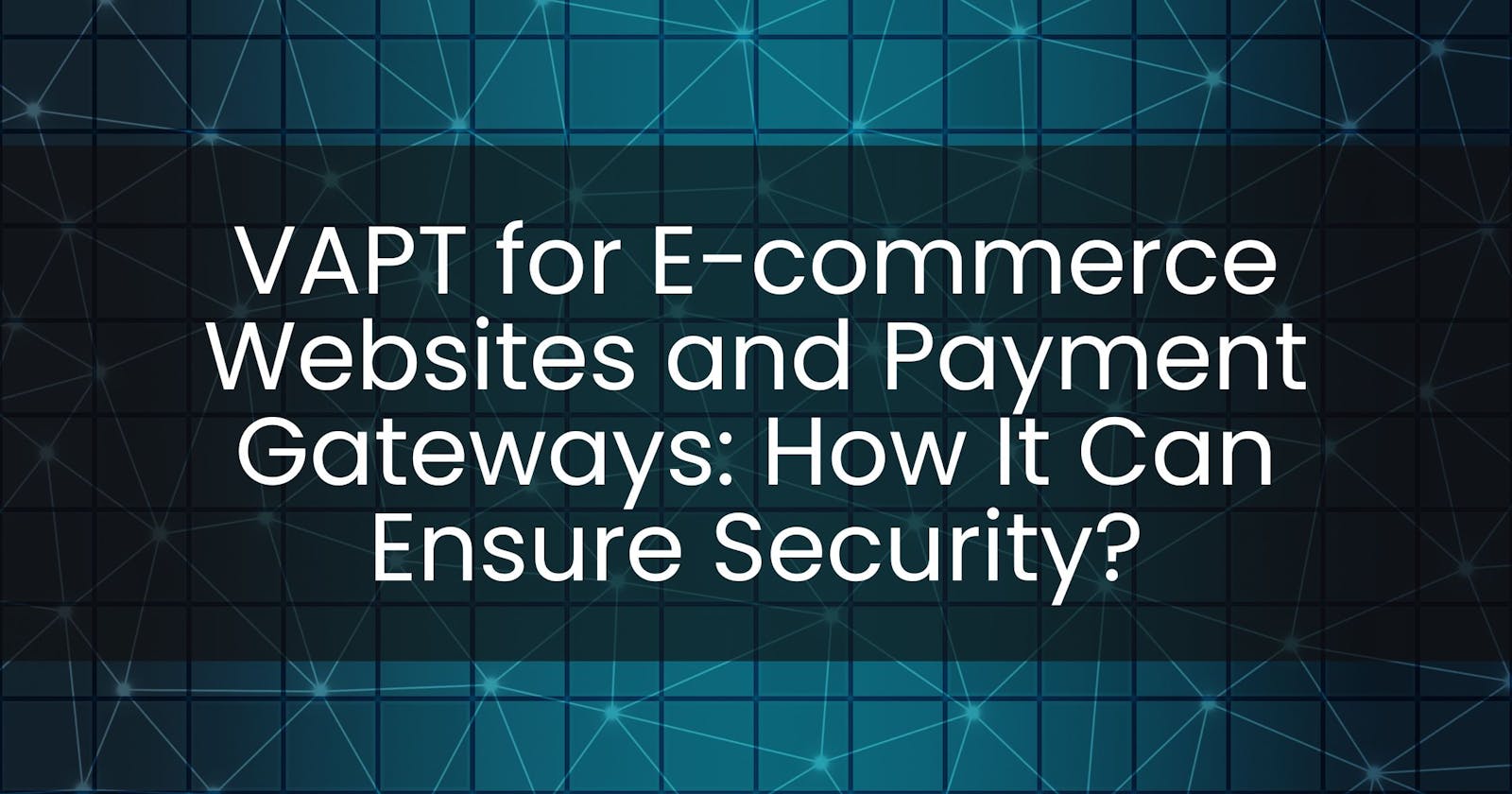VAPT for E-commerce Websites and Payment Gateways: How It Can Ensure Security?
RSK Cyber Security
Cybersecurity is crucial for e-commerce websites and payment gateways as they handle sensitive customer data and financial transactions. A breach could result in serious repercussions, such as monetary losses, reputational harm, and legal liability.
Strong security measures like vapt testing are put in place to safeguard consumer data. Plus, it can stop unauthorized access, and resist cyberattacks like fraud and data breaches. E-commerce platforms must gain users' trust and confidence to succeed, making cybersecurity an essential component of their operations.
In this blog, we will discuss how VAPT is able to secure these e-commerce websites and payment gateways…
VAPT for E-commerce Websites and Payment Gateways: How It Can Ensure Security?
Here's how VAPT testing can help ensure the security of e-commerce websites and payment gateways:
1. Identify Vulnerabilities:
VAPT testing starts with a vulnerability assessment. It checks the payment gateway and e-commerce website for known security flaws such as out-of-date software, and configuration errors. Additionally, it also looks out for third-party component vulnerabilities. This process aids in identifying possible exploitation locations.
2. Protect Customer Data:
Sensitive consumer data, including credit card numbers and personal information, is stored by e-commerce websites and payment gateways. You can protect this data through encryption, safe storage procedures, and appropriate access controls. VAPT makes sure that all these measures are in place and functional.
3. Prevent Data Breaches:
The goal of VAPT testing is to find and fix vulnerabilities that could result in data breaches. It reduces the risk of unauthorized access to consumer data is reduced by proactively correcting these problems. Eventually, it protects both the customers and the e-commerce company.
4. Ensure Secure Authentication:
VAPT assessment validates the efficiency of the authentication methods used on the website and payment gateway. It looks for weak passwords, improper password restrictions, and any vulnerabilities that could allow for authentication bypass.
5. Secure Payment Gateway Integration:
The integration of payment gateways with the e-commerce website is secured thanks to VAPT testing. It confirms that sensitive payment data is delivered securely and that communication channels are encrypted (e.g., using TLS/SSL).
6. Prevent SQL Injection and Cross-Site Scripting (XSS) Attacks:
SQL injection and XSS vulnerabilities, which are frequently used by attackers to breach websites and steal sensitive data. You can find and fix these vulnerabilities with the use of VAPT testing.
7. Mitigate DDoS Attacks:
You can assess the website's resistance against Distributed Denial of Service (DDoS) assaults with VAPT testing. It aids in putting safety precautions in place to lessen the effect that such assaults have on the availability of the e-commerce platform.
8. Comply with Industry Regulations:
Many e-commerce companies must adhere to industry rules and compliance requirements, such as PCI DSS for processing credit and debit cards. VAPT testing assures compliance with security best practices while assisting in meeting these criteria.
9. Enhance Customer Trust:
E-commerce companies can show their dedication to protecting consumer data and win over their user base. They can do it by routinely conducting VAPT tests and correcting security flaws.
10. Improve Incident Response Readiness:
With the aid of VAPT testing, you can address your security posture at multiple levels. It comes in handy to evaluate the effectiveness of incident response plans and the organization's capacity to quickly identify and address security events.
However, VAPT testing is a continuous process. It should be done on a regular basis, especially when the payment gateway or e-commerce platform is modified. Continuous VAPT testing supports a proactive security posture and allows for adaptation to new threats.
Choosing the Right VAPT Testing Service Provider for E-Commerce Websites
Here are short points to guide you in making the right choice:
1. Expertise and Experience: Choose a service provider who specializes in VAPT testing for e-commerce systems and has a track record in this area. They would be aware of the particular security difficulties facing the e-commerce sector because of their prior experience.
2. Certifications and Standards: To ensure thorough testing, confirm that the provider's team adheres to industry standards (e.g., OWASP, PCI DSS). Plus, it must hold the necessary certifications (e.g., CEH, OSCP).
3. Methodology and Tools: Recognize their testing strategy and the equipment they employ. For a thorough inspection, a blend of automatic scanning and manual testing is appropriate.
4. Reporting and Remediation Support: Look for reports that are clear and thorough and include the detected weaknesses and suggested corrections. Search for service providers who give post-testing help to aid in the fixing of vulnerabilities.
5. Industry Reputation: Research the provider's reputation by reading reviews, testimonials, and case studies from previous clients.
By choosing a reliable vapt testing service provider, you can give your customers confidence in your e-commerce website's security and protect your brand's reputation.
